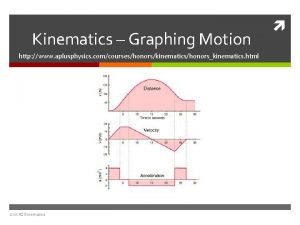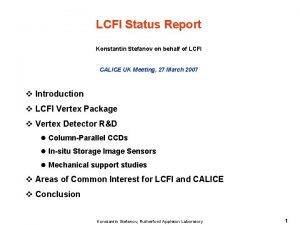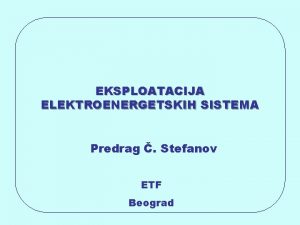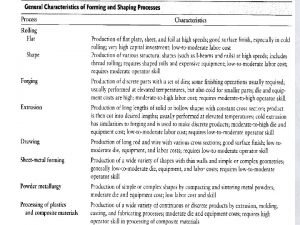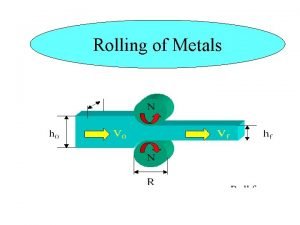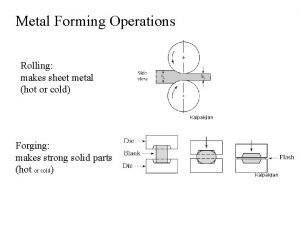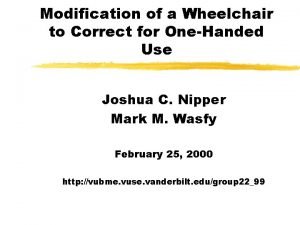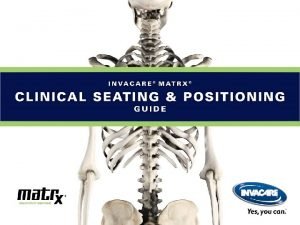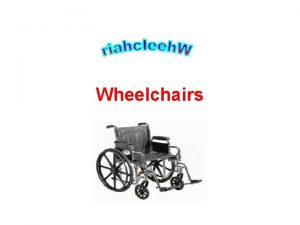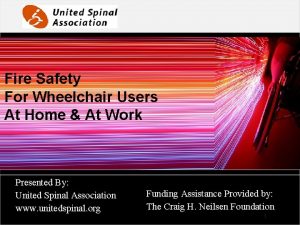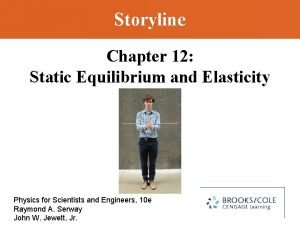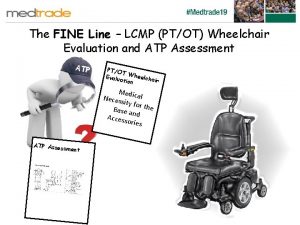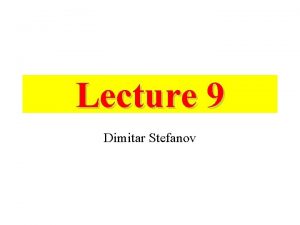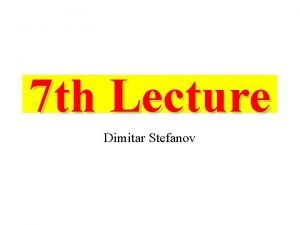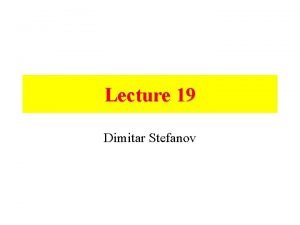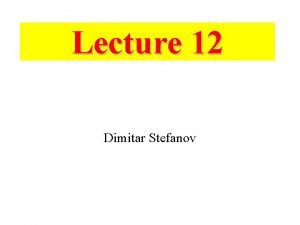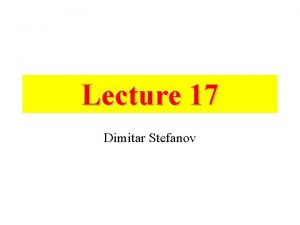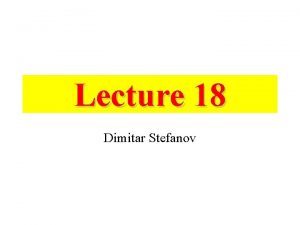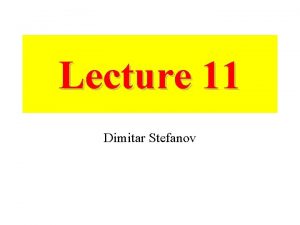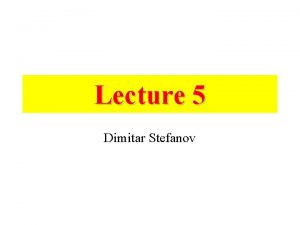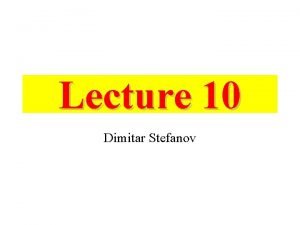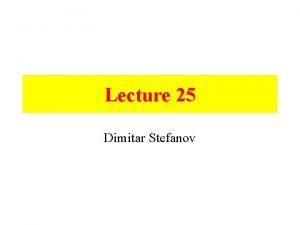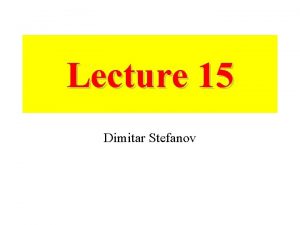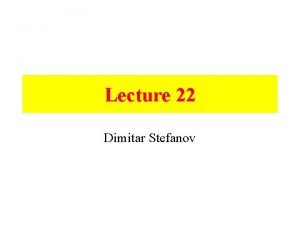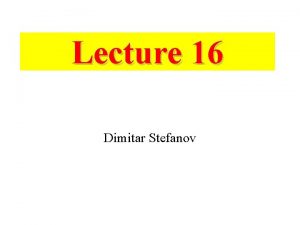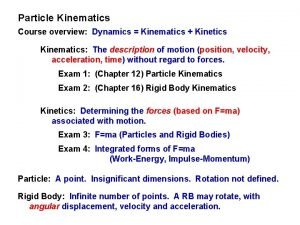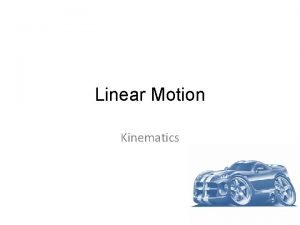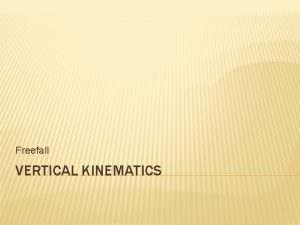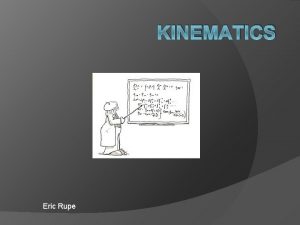Lecture 23 Dimitar Stefanov Wheelchair kinematics Recapping Rolling



















- Slides: 19

Lecture 23 Dimitar Stefanov

Wheelchair kinematics Recapping Rolling wheels Instantaneous Centre of Curvature (ICC) motion must be consistent Nonholonomic constraint

Position Estimation (xn+1, yn+1) (xn, yn) Basic position estimation equations are: where: D = vehicle displacement along path; Θ = vehicle orientation (heading).

Ackerman Steering • The inside front wheel is rotated slightly sharper than the outside wheel (reduces tire slippage). • Ackerman steering provides a fairly accurate dead-reckoning solution while supporting traction and ground clearance. • Generally the method of choice for outdoor autonomous vehicles.

Ackerman Steering (cont. 1) Θo Θi Ackerman equation: where: Θi = relative steering angle of inner wheel; Θo = relative steering angle of outer wheel; l = longitudinal wheel separation; d = lateral wheel separation.

Ackerman Steering (cont. 2) Θo ΘSA Θi ΘSA = vehicle steering angle.

Synchro Drive • Three or more wheels are mechanically coupled. All wheels have one and the same orientation and rotate in the same direction at the same speed. • Improved dead reckoning. • Synchro drives use belt, chain or gear drives. • Problems in steering accuracy with wear/tear

Synchro Drive Dead reckoning for synchro-drive:

The MECANUM wheel (concept)

Tricycle • If a steerable drive wheel and encoder is used, then we can use the Ackerman steering model. • Otherwise use we the differential odometry mode

Tricycle Problems • When going uphill the center of gravity of the wheelchair tends to move away from driven wheel. Causing loss of traction. • As Ackerman-steered design causes surface damage.

Omni-Directional Drives • Minimum is a 3 wheel configuration. • Each individual motor are driven independently, using velocity control.

Omni-Directional Drives, continue Let’s note the velocity of the wheelchair platform in x and y direction with Vx and Vy respectively.

Beacon-based Localization • Trilateration – Determine wheelchair position from distance measurements to 3 or more known beacons. • Triangulation – Determine wheelchair position for angular measurements to 3 or more known beacons.

Triangulation • Solution to constraint equations relating the pose of an observer to the positions of a set of landmarks. • Usually, the problem is considered in the 2 D case.

Triangulation • Passive • Active triangulation (AT): -A controlled light source (such as a laser) is positioned at point P 1. -A imaging detector is placed at P 2. -The distance A is preliminary known. -The image detector measures the angle position of the reflected-light beam. • AT requires one camera or one position sensitive detector; • AT does not depend on the ambient lighting of the object.

Active triangulation Photo detector – one- or two-dimensional array detector such as a CCD camera or photosensitive line. Calibration – signals are measured on two preliminary known distances between the sensors and the object.

Active rangefinder chip – an example TRC Beacon navigation System

Light guidance system, Dohi Lab, Japan
 Dimitar sasselov
Dimitar sasselov John nochev
John nochev Dimitar obshti
Dimitar obshti Aplusphysics kinematics-horizontal kinematics
Aplusphysics kinematics-horizontal kinematics Konstantin stefanov
Konstantin stefanov Polarni dijagram
Polarni dijagram Difference between flat rolling and shape rolling
Difference between flat rolling and shape rolling Rolling
Rolling Hot rolling vs cold rolling
Hot rolling vs cold rolling Hot rolling
Hot rolling Zipper cracks in rolling
Zipper cracks in rolling 01:640:244 lecture notes - lecture 15: plat, idah, farad
01:640:244 lecture notes - lecture 15: plat, idah, farad One handed wheelchair
One handed wheelchair Wheelchair backrest for scoliosis
Wheelchair backrest for scoliosis Wheelchair rugby murderball
Wheelchair rugby murderball Olectanon
Olectanon Fire safety for wheelchair users
Fire safety for wheelchair users Modulus of elasticity
Modulus of elasticity Atp wheelchair evaluation
Atp wheelchair evaluation Chapter 15 scalp care, shampooing, and conditioning
Chapter 15 scalp care, shampooing, and conditioning



